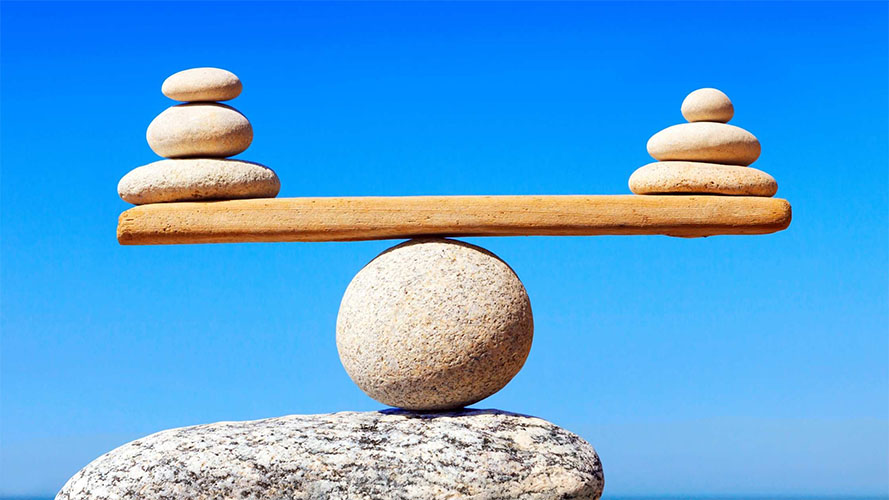
Ayurveda which translates simply as ‘knowledge of life’ is an ancient Indian holistic philosophy that focuses on bringing balance to your physical, mental, and spiritual health. It is considered by many to be the oldest healing science.
Ayurveda emphasises prevention and encourages health maintenance through balance in all areas of life from lifestyle to diet, and environment. Knowledge of Ayurveda enables us to understand how to create this balance of body, mind, and spirit according to our own individual constitution and how to make lifestyle changes to bring about and maintain this balance.

There are three doshas in Ayurveda, which describe the dominant mind/body state: vata, pitta, and kapha. While all three are present in everyone, Ayurveda proposes that we each have a dominant dosha that’s unwavering from birth, and ideally an equal balance between the other two.
Based on centuries of Ayurvedic practice, an Ayurvedic practitioner can determine one’s dosha based on physical, emotional, mental, and behavioural characteristics.
Doshas exert influence upon all physical and mental processes according to the ratio in which they are present. When the doshas are balanced, we are healthy; when they are unbalanced, we develop disease. To achieve proper balance of your own unique dosha combination, you need to understand the qualities of the three doshas and how they vary with the cycles of nature.
Vata consists mostly of the two elements air and space (also known as ether) and is generally described as cold, light, dry, rough, flowing, and spacious. Those with a predominant vata dosha are usually described as slim, energetic, and creative. When in proportion it gives keen senses, clarity of thought, creativity, and a healthy respiratory system. When out of balance constipation, poor memory, uncertainty, anxiety, dry skin, and more can result.
Kapha is based on earth and water. It can be described as steady, stable, heavy, slow, cold, and soft. People with a dominant kapha dosha are described as strong, thick-boned, and caring. When in balance, kapha is responsible for strong tissues, well-lubricated joints, and a calm mind. When it goes out of balance it causes obesity, water retention, allergies, congestion, and sadness.
The pitta dosha is based on fire and water. It’s commonly described as hot, light, sharp, oily, liquid, and mobile. People with pitta dominance are said to usually have a muscular build, be very athletic, and serve as strong leaders. They’re highly motivated, goal-oriented, and competitive. When in proportion pitta gives focus, motivation, sharp mind, and quick metabolism. When fire energy accumulates too much, it causes anger, jealousy, acid reflux, diarrhoea, oily skin, rashes and painful menstruation.
Once you understand what dosha combination makes up your Ayurveda constitution, you can start keeping it in balance through the right diet, exercise, and lifestyle choices.

Ayurvedic practitioners focus on maintaining the balance of energy through diet, exercise, and mindfulness that they believe is essential to overall health.
Any dosha that gets out of balance can disturb the functions of the other doshas. To balance a particular dosha, we must cultivate the qualities opposite to the dosha(s) we’re trying to balance, to achieve this, we need to assess everything from the food we eat to our daily routine.
The cause of disease in Ayurveda is viewed as a lack of proper cellular function due to an excess or deficiency of vata, pitta or kapha. Disease can also be caused by the presence of toxins. Diet and lifestyle appropriate to one’s individual dosha strengthen the body, mind and spirit.
Many factors, both internal and external, act upon us to disturb our dosha balance. Physical and emotional stresses including diet, seasonal changes, physical trauma, work and relationships can disturb this balance.
Vata represents movement, and when out of balance it causes problems in mind and body from constipation, to insomnia and poor circulation. Vata in balance gives us creativity, and alertness, however, when we are overrun by vata, we can become unfocused, unable to complete tasks, overwhelmed, and anxious. Our digestion also suffers.
To rebalance vata, stability and grounding are important:
Pitta represents metabolism and transformation. When out of balance, pitta causes problems related to excessive heat and acidity in mind and body such as indigestion, anger, fever and rashes. Those with a pitta-influenced constitution tend to be ambitious and competitive. They tend to over-do it and often need moderation.
Pitta in balance allows us the ability to be creative. When out of balance, we can get burned out and suffer from adrenal fatigue, tending towards irritability, anger, and frustration.
To rebalance pitta:
Incorporate cooling foods and herbs. Avoid hot, spicy, fried, and salty foods. Coffee is a pitta-aggravating drink. If you do drink coffee, drink it with milk, which helps to cool the acidic nature of coffee.
Kapha represents structure. By nature, kapha is stable, slow and resistant to change. When out of balance, kapha causes problems in mind and body related to accumulation and stagnation, such as obesity, slow digestion, congestion, lethargy, and depression. Kapha needs mental stimulation and physical activity to stay in balance.
To rebalance Kapha:
Share this post
| Cookie | Duration | Description |
|---|---|---|
| __stripe_mid | 1 year | Stripe sets this cookie cookie to process payments. |
| __stripe_sid | 30 minutes | Stripe sets this cookie cookie to process payments. |
| _abck | 1 year | This cookie is used to detect and defend when a client attempt to replay a cookie.This cookie manages the interaction with online bots and takes the appropriate actions. |
| ak_bmsc | 2 hours | This cookie is used by Akamai to optimize site security by distinguishing between humans and bots |
| bm_sz | 4 hours | This cookie is set by the provider Akamai Bot Manager. This cookie is used to manage the interaction with the online bots. It also helps in fraud preventions |
| cookielawinfo-checkbox-advertisement | 1 year | Set by the GDPR Cookie Consent plugin, this cookie is used to record the user consent for the cookies in the "Advertisement" category . |
| cookielawinfo-checkbox-analytics | 11 months | This cookie is set by GDPR Cookie Consent plugin. The cookie is used to store the user consent for the cookies in the category "Analytics". |
| cookielawinfo-checkbox-functional | 11 months | The cookie is set by GDPR cookie consent to record the user consent for the cookies in the category "Functional". |
| cookielawinfo-checkbox-necessary | 11 months | This cookie is set by GDPR Cookie Consent plugin. The cookies is used to store the user consent for the cookies in the category "Necessary". |
| cookielawinfo-checkbox-others | 11 months | This cookie is set by GDPR Cookie Consent plugin. The cookie is used to store the user consent for the cookies in the category "Other. |
| cookielawinfo-checkbox-performance | 11 months | This cookie is set by GDPR Cookie Consent plugin. The cookie is used to store the user consent for the cookies in the category "Performance". |
| elementor | never | This cookie is used by the website's WordPress theme. It allows the website owner to implement or change the website's content in real-time. |
| PHPSESSID | session | This cookie is native to PHP applications. The cookie is used to store and identify a users' unique session ID for the purpose of managing user session on the website. The cookie is a session cookies and is deleted when all the browser windows are closed. |
| viewed_cookie_policy | 11 months | The cookie is set by the GDPR Cookie Consent plugin and is used to store whether or not user has consented to the use of cookies. It does not store any personal data. |
| Cookie | Duration | Description |
|---|---|---|
| _mcid | 1 year | This is a Mailchimp functionality cookie used to evaluate the UI/UX interaction with its platform |
| mailchimp_landing_site | 1 month | The cookie is set by MailChimp to record which page the user first visited. |
| Cookie | Duration | Description |
|---|---|---|
| _ga | 2 years | The _ga cookie, installed by Google Analytics, calculates visitor, session and campaign data and also keeps track of site usage for the site's analytics report. The cookie stores information anonymously and assigns a randomly generated number to recognize unique visitors. |
| _gat_gtag_UA_57442626_1 | 1 minute | Set by Google to distinguish users. |
| _gcl_au | 3 months | Provided by Google Tag Manager to experiment advertisement efficiency of websites using their services. |
| _gid | 1 day | Installed by Google Analytics, _gid cookie stores information on how visitors use a website, while also creating an analytics report of the website's performance. Some of the data that are collected include the number of visitors, their source, and the pages they visit anonymously. |
| Cookie | Duration | Description |
|---|---|---|
| _fbp | 3 months | This cookie is set by Facebook to display advertisements when either on Facebook or on a digital platform powered by Facebook advertising, after visiting the website. |
| fr | 3 months | Facebook sets this cookie to show relevant advertisements to users by tracking user behaviour across the web, on sites that have Facebook pixel or Facebook social plugin. |
| test_cookie | 15 minutes | The test_cookie is set by doubleclick.net and is used to determine if the user's browser supports cookies. |
| Cookie | Duration | Description |
|---|---|---|
| _tcfpup | 5 years | No description available. |
| _tcSecSess | session | No description available. |
| _tcSessInfo | session | No description available. |
| CookieLawInfoConsent | 1 year | No description |
| cookies.js | session | No description available. |
| m | 2 years | No description available. |
| ti_ukp | 5 years | No description available. |